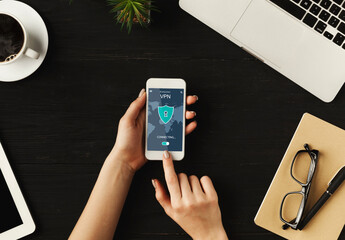
A VPN will protect your data, but it won’t necessarily keep hackers out of your device. Most VPN services don’t encrypt your data, which makes them vulnerable to hacking.
To access the Internet, users must go through a network of servers called the Internet backbone. These servers act as gateways between the public and private networks. It also provides security from hackers and other malicious threats.
Virtual Private Networks (VPNs) are software applications that allow you to browse the web privately and securely. They encrypt your data and route it through their servers instead of the public Internet. Although they offer privacy, they can slow down your connection speed.
“Running a VPN on an iOS device like an iPhone or iPad does not fully secure your data or hide your identity from snoopers.” Security researcher Michael Horowitz clarified.
Horowitz noted that VPNs for iOS have been inoperable for at least the past two years, according to a report in Ars Technica. It has to do with the way Apple’s mobile operating system manages internet connections, and the issue was first brought up by Proton VPN back in 2020.
An operating system must shut down all active internet connections before reestablishing them through the secure VPN tunnel while connecting to a VPN. As a result, the VPN conceals all traffic travelling through the device from prying eyes. It is not the case with iOS, however. New internet connections made while connected to a VPN will use it, but iOS does not terminate and reopen any running links.
Even if the user thinks the VPN is protecting them, the end consequence is that data leaks from an iOS device. Horowitz examined this most recently with iOS 15.6 and found that data leaks still occur, even though the issue was first brought up when iOS 13 was the most recent version. Horowitz also discovered a reference to VPN data leakage in iOS 11.2.5 from 2018.
Given that this is an iOS issue, it is Apple’s responsibility to offer a solution, which, according to this data, has not been done since iOS 11. To force reconnections, Proton VPN advises putting your smartphone in aeroplane mode, connecting to a VPN, and then turning it back off.
“A dedicated VPN router is the only way to guarantee your privacy and security,” he asserted.
Recent testing has revealed that although the kill switch feature Apple gave developers with iOS 14 can indeed restrict extra network traffic, it can still deliver some DNS requests from Apple services outside the VPN connection. This circumstance reminds us of the one we wrote about two years ago.
Most of these connections are transient and eventually reestablish themselves independently through the VPN tunnel. On the other hand, some are persistent and can continue to function temporarily or permanently outside the VPN tunnel. On the other hand, if you use Proton VPN when connected to a public WiFi network, no one can monitor your private traffic.

More Stories
UNSW Sydney Engineers Developed an Improved, Affordable Wi-Fi System That Helps Fire Safety
University of New South Wales Sydney engineers have created a novel fire detection system that is available at a fraction...
Australia-China Tensions: Following the Chinese Ambassador’s Speech, the Twitter Assault Fizzles
A Twitter botnet began promoting YouTube videos that falsely claimed the ABC was an Australian propaganda website less than a...
Cloud Adoption: Accelerating the Evolution of Healthcare System
The transmission of computing resources via the Internet, as opposed to on-site, is called cloud computing. The healthcare sector is...
Update Your iPhone, Mac, or iPad Now to Fix Zero-Day Exploit
Apple has released its Safari 15.6.1, which fixes a zero-day exploit discovered last week. The vulnerability allowed hackers to execute...
Facebook Messenger Is Testing a New Feature That Lets Users Securely Store Backups of Their End-To-End Encrypted Chats
On Thursday, Meta (formerly Facebook) announced they would test a new feature that allows for secure storage of backups for...
AI-Powered Technology in the Workplace: Does It Provide Employees With Safety and Protection?
Artificial Intelligence (AI) that uses cameras for workplace monitoring to check for health and safety violations for worker protection and...


